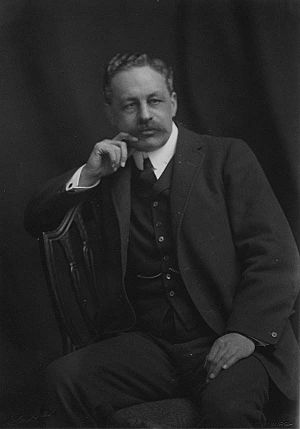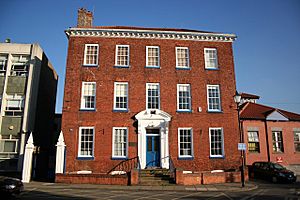Halford Mackinder facts for kids
Quick facts for kids
Sir Halford Mackinder
|
|
|---|---|
 |
|
| Born |
Halford John Mackinder
15 February 1861 Gainsborough, England
|
| Died | 6 March 1947 (aged 86) |
| Alma mater | Christ Church, Oxford |
| Known for | "The Geographical Pivot of History" |
| Awards | Charles P. Daly Medal (1943) |
| Scientific career | |
| Fields |
|
| Influenced | Nicholas Spykman, Karl Haushofer, Henry Kissinger, Hilda Ormsby, Zbigniew Brzezinski, Dimitri Kitsikis, Aleksandr Dugin |
Sir Halford John Mackinder (born February 15, 1861 – died March 6, 1947) was an important English geographer, a university teacher, and a politician. He is known as one of the main people who helped create the studies of geopolitics and geostrategy. These fields look at how geography affects politics and military plans. He was the first leader of University Extension College, Reading (which later became the University of Reading) from 1892 to 1903. He also directed the London School of Economics from 1903 to 1908. While still teaching part-time, he was also a Member of Parliament for Glasgow Camlachie from 1910 to 1922. Later, from 1923, he was a Professor of Geography at the London School of Economics.
Contents
Early Life and Education

Halford Mackinder was born in Gainsborough, Lincolnshire, England. His father was a doctor. He went to school at Queen Elizabeth's Grammar School in Gainsborough and Epsom College. Later, he studied at Christ Church, Oxford University.
At Oxford, he first studied natural sciences, focusing on zoology. He was interested in how the theory of evolution could be seen in human history. He believed that both physical geography (like mountains and rivers) and human geography (how people live and interact with the land) should be studied together.
Mackinder was the President of the Oxford Union in 1883. He earned a degree in biology in 1883 and another in modern history the next year.
Mackinder's Career and Ideas
In 1887, Mackinder wrote an important paper called "On the Scope and Methods of Geography." This paper helped define what modern geography should be. A few months later, he became a geography teacher at the University of Oxford. This was a very important job for a British geographer at that time.
In 1892, he became the first principal of University Extension College, Reading. This college later grew into the University of Reading. He also helped start the Geographical Association in 1893. This group helps promote the teaching of geography in schools.
Founding the London School of Economics
In 1895, Mackinder helped to create the London School of Economics. At Oxford, he was also key in setting up a School of Geography in 1899.
In the same year, he led an expedition to climb Mount Kenya. This was the first time Europeans had reached the summit of this mountain.
In 1902, he published a book called Britain and the British Seas. This book described the landforms of the British Isles in detail and became a classic geography text.
The Heartland Theory
In 1904, Mackinder presented a famous paper called "The Geographical Pivot of History" to the Royal Geographical Society. In this paper, he introduced his "Heartland Theory." This theory is often seen as the beginning of geopolitics.
The Heartland Theory suggested that a large area of land in Eastern Europe and Central Asia (which he called the "Heartland") was the most important place on Earth for controlling global power. He believed that whoever controlled this "Heartland" could eventually control the "World Island" (Eurasia and Africa), and then the whole world.
His most famous quote from his 1919 book, Democratic Ideals and Reality, was: "Who rules East Europe commands the Heartland; Who rules the Heartland commands the World Island; Who rules the World Island commands the World." This idea was meant to show world leaders at the Paris Peace Conference after World War I how important Eastern Europe was.
Political Life and Later Work
Mackinder became the director of the London School of Economics in 1904. After 1908, he focused on promoting the idea of a strong British Empire.
He was elected to Parliament in 1910, representing Glasgow Camlachie. He served as a Member of Parliament until 1922. He was knighted in 1920 for his public service.
During the Russian Civil War (1919-1920), Mackinder was a British High Commissioner in Southern Russia. He believed Britain should support the anti-Bolshevik forces there.
His last major work was an article in 1943 called "The Round World and the Winning of the Peace." In it, he updated his Heartland view for the post-World War II world. He suggested that North America would become more connected to the "Heartland" region.
Mackinder's Importance
Mackinder's work was very important for making geography a respected academic subject in the United Kingdom. Many people believe he did more than anyone else to promote the teaching of geography in Britain.
He is also credited with introducing two new words into the English language: "manpower" and "heartland."
In 1944, he received the Charles P. Daley medal from the American Geographical Society. In 1945, he was given the Patron's Medal by the Royal Geographical Society for his contributions to geography.
His Heartland Theory greatly influenced how the United States planned its strategies during the Cold War. It is still studied today, for example, in relation to China's Belt and Road Initiative. His ideas also influenced other geographers like Dimitri Kitsikis and Asanga Abeyagoonasekera.
Works
- Mackinder, H.J. "On the Scope and Methods of Geography", Proceedings of the Royal Geographical Society and Monthly Record of Geography, New Monthly Series, Vol. 9, No. 3 (Mar. 1887), pp. 141–174.
- Mackinder, H.J. Sadler, M.E. University extension: has it a future?, London, Frowde, 1890.
- Mackinder, H.J. "The Physical Basis of Political Geography", Scottish Geographical Magazine Vol 6, No 2, 1890, pp. 78–84.
- Mackinder, H.J. "A Journey to the Summit of Mount Kenya, British East Africa", The Geographical Journal, Vol. 15, No. 5 (May 1900), pp. 453–476.
- Mackinder, H.J. Britain and the British Seas. New York: D. Appleton and company, 1902.
- Mackinder, H.J. "An Expedition to Possil, an Outpost on the Frontiers of the Civilised World", The Times. 12 October 1903.
- Mackinder, H.J. "The geographical pivot of history". The Geographical Journal, 1904, 23, pp. 421–37. Available online as Mackinder, H.J. "The Geographical Pivot of History", in Democratic Ideals and Reality, Washington, DC: National Defence University Press, 1996, pp. 175–194.
- Mackinder, H.J. "Man-Power as a Measure of National and Imperial Strength", National and English Review, XLV, 1905.
- Mackinder, H.J. "Geography and History", The Times. 9 February 1905.
- Mackinder, H.J. as editor of The Regions of the World series which includes the 1902 Britain and the British Seas mentioned above—which included The Nearer East by D.G. Hogarth London, Henry Frowde, 1902 and 1905
- Mackinder, H.J. Our Own Islands: An Elementary Study in Geography, London: G. Philips, 1907
- Mackinder, H.J. The Rhine: Its Valley & History. New York: Dodd, Mead. 1908.
- Mackinder, H.J. Eight Lectures on India. London : Waterlow, 1910.
- Mackinder, H.J. The Modern British State: An Introduction to the Study of Civics. London: G. Philip, 1914.
- Mackinder, H.J. Democratic Ideals and Reality: A Study in the Politics of Reconstruction. New York: Holt, 1919. Available online as Democratic ideals and reality; a study in the politics of reconstruction Democratic Ideals and Reality, Washington, DC: National Defence University Press, 1996.
- Mackinder, H.J. 1943. "The round world and the winning of the peace", Foreign Affairs, 21 (1943) 595–605. Available online as Mackinder, H.J. "The round world and the winning of the peace", in Democratic Ideals and Reality, Washington, DC: National Defence University Press, 1996, pp. 195–205.
Images for kids
See also
 In Spanish: Halford John Mackinder para niños
In Spanish: Halford John Mackinder para niños


